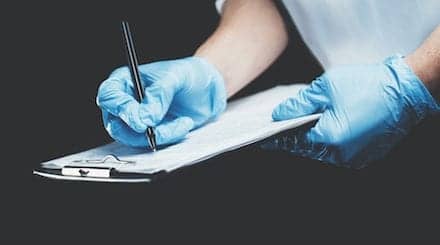Emerging diagnostic company Veravas, Charleston, SC, and Oakdale, Minn, has launched a portfolio of products that can improve the accuracy of test results by helping laboratory technicians to detect and manage biotin interference in patient samples. The products—VeraTest Biotin, VeraPrep Biotin, and VeraBind Biotin—are currently for research use only.
VeraTest Biotin and VeraPrep Biotin offer immediate solutions to address biotin interference in existing diagnostic tests. VeraTest Biotin is a digital qualitative test that screens for biotin interference in less than 5 minutes. VeraPrep Biotin can determine whether biotin levels are clinically significant and, using targeted nanomagnetic beads, capture and remove biotin from a sample. Proof-of-concept studies demonstrated that these products can determine whether biotin interference exists, detect clinically significant levels, and reduce interfering biotin in patient samples.
Biotin interference is a growing problem in laboratory diagnostics. The use of biotin is steadily increasing worldwide, and it is found in over-the-counter multivitamins, prenatal vitamins, and dietary supplements for hair, skin, and nail growth. Taking high-dose biotin supplements can interfere with laboratory assays and cause incorrect test results. Ultimately, such interference can lead to misdiagnosis, inappropriate patient management, and adverse events. Because of the potential harm to patients, in 2017 FDA issued guidance to in vitro diagnostic device manufacturers to include clear labeling to indicate biotin interference levels for clinical laboratories and clinicians to consider when interpreting test results.

Damien Gruson, PharmD, PhD, Université Catholique de Louvain and Cliniques Universitaires Saint-Luc.
The growing number of people taking high-dose biotin supplements means many labs have no solutions for effectively measuring biotin levels, which increases the likelihood of inaccurate test results. Improving test results will lead to more accurate diagnoses, effective medical intervention, and better patient outcomes.
VeraBind Biotin is a proprietary monoclonal antibody that can be used by diagnostic manufacturers to remove biotin interference in assays. This antibody retains a high binding affinity to conjugated biotin with a low binding affinity to free biotin, thus eliminating the impact of biotin interference on test results.
“Interferences with immunoassays are prevalent and can affect laboratory tests results, which have an impact on clinical decisions for patients. At the end of the day, this is an issue of patient safety,” says Damien Gruson, PharmD, PhD, professor of cardiology, biochemistry, and molecular genetics at the Université Catholique de Louvain and head of the department of clinical chemistry at Cliniques Universitaires Saint-Luc. “Biotin interference has been increasing and there is a critical need for technologies to help clinical laboratories and the industry address it. I believe that the best, long-term way to solve for the challenges caused by the streptavidin-biotin interaction technology used by many immunoassays will be the continuous improvement and evolution of these tests. I am really enthusiastic that Veravas is leading the way in providing novel accessible tools that support the development of biotin-interference-free tests.”
For more information, visit Veravas.



